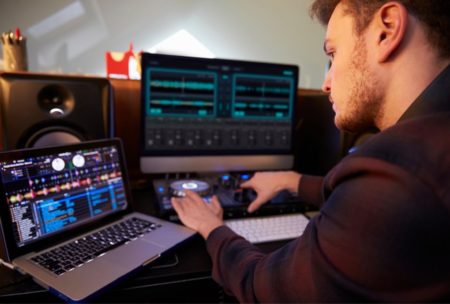This course is designed for those interested to learn about minor keys for electronic musicians. Read more.
Jason Allen is a PhD in music, and was recently named one of the semi-finalists for the Grammy Foundations "Music Educator" award.
Access all courses in our library for only $9/month with All Access Pass
Get Started with All Access PassBuy Only This CourseAbout This Course
Who this course is for:
- This course is ideal for music theory beginners, as well as students with some background in music theory.
- Anyone who produces music, or aspires to produce music, should take the course.
- Anyone interested in producing their own tracks. This will get you up and running and give your tracks a unique sound in no time.
What you’ll learn:
- Understand and apply minor chords
- Use the circle of fifths to generate new ideas for your own tracks
- Work within minor keys to write compelling melodies and basslines
Requirements:
- Although Ableton Live is used in the class, students do not need to be Live users. But they should have access to some kind of audio program with MIDI sequencing. Garageband, Logic, or several free pieces of software all work great.
- No MIDI instruments are required.
This course is an extension of Music Theory for Electronic Musicians, in which we learned how to work with the piano roll editor in a DAW to make harmonies, melodies, and whole tracks. In this class, we expand on those ideas and work with minor keys, focus some time on melody writing and bassline writing, and talk about how different tracks work.
Extensive Analysis
The most important part of this class is an extensive analysis of tracks by Daft Punk, Avicii, Skrillex, and much more. In each of these analysis segments, we look at their tracks on the piano roll editor, and talk about why they sound the way they do, and how you can use similar techniques in your own music. Each of these segments picks apart multiple elements of the song and dissects it in an easy to understand way.
Structure
This course consists of video lectures, which all contain a session in Ableton Live 9. If you are using a different program (or none at all), no worries! This isn’t a class on how to use Ableton Live, and the concepts can be applied to any DAW.
Our Promise to You
By the end of this course, you will have the knowledge about minor keys for electronic musicians.
10 Day Money Back Guarantee. If you are unsatisfied for any reason, simply contact us and we’ll give you a full refund. No questions asked.
Get started today and learn more about minor keys for electronic musicians.
Course Curriculum
| Section 1 - Welcome And Overview | |||
| Welcome | 00:00:00 | ||
| Section 2 - Analysis: Shame On Me (Avicii) | |||
| Analysis: Shame On Me (Avicii) | 00:00:00 | ||
| Section 3 - Minor Scales And Keys | |||
| Minor Scales | 00:00:00 | ||
| Relative Keys | 00:00:00 | ||
| Minor Diatonic Chord Progression | 00:00:00 | ||
| The Case Of The Melodic And Harmonic Minor Scales | 00:00:00 | ||
| Section 4 - Analysis: Ghosts N Stuff (Deadmau5) | |||
| Analysis: Ghosts N Stuff (Deadmau5) | 00:00:00 | ||
| Section 5 - The Circle Of Fifths | |||
| Why? What We Know So Far | 00:00:00 | ||
| Changing Keys Within Your Track | 00:00:00 | ||
| Section 6 - Analysis: Get Lucky (Daft Punk) | |||
| Analysis: Get Lucky (Daft Punk) | 00:00:00 | ||
| Section 7 - A Few More Chord Extensions | |||
| 7th Chords In Minor | 00:00:00 | ||
| 9ths And 13ths | 00:00:00 | ||
| Suspended Chords | 00:00:00 | ||
| Reading A Chord Chart | 00:00:00 | ||
| Cluster And Unnamed Chords | 00:00:00 | ||
| Section 8 - Analysis: Everything You Do Is A Balloon (Boards Of Canada) | |||
| Analysis: Everything You Do Is A Balloon (Boards Of Canada) | 00:00:00 | ||
| Section 9 - Melody Writing | |||
| Writing Melodies For Chord Progressions | 00:00:00 | ||
| Writing Chord Progressions For Melodies | 00:00:00 | ||
| Counter Melody: Arpeggiation | 00:00:00 | ||
| Section 10 - Analysis: Scary Monsters And Nice Sprites (Skrillex) | |||
| Analysis: Scary Monsters And Nice Sprites (Skrillex) | 00:00:00 | ||
| Section 11 - Bass Lines | |||
| Follow The Root Note | 00:00:00 | ||
| Bass Riffs | 00:00:00 | ||
| Get Muddy | 00:00:00 | ||
| Section 12 - Analysis: Windowlicker (Aphex Twin) | |||
| Analysis: Windowlicker (Aphex Twin) | 00:00:00 | ||
| Section 13 - Chromaticism | |||
| Chromaticism | 00:00:00 | ||
| Section 14 - Thanks And Goodbye! (For Now) | |||
| Thanks And Goodbye! (For Now) | 00:00:00 | ||
| Some Extra Video Resources | 00:00:00 | ||
About This Course
Who this course is for:
- This course is ideal for music theory beginners, as well as students with some background in music theory.
- Anyone who produces music, or aspires to produce music, should take the course.
- Anyone interested in producing their own tracks. This will get you up and running and give your tracks a unique sound in no time.
What you’ll learn:
- Understand and apply minor chords
- Use the circle of fifths to generate new ideas for your own tracks
- Work within minor keys to write compelling melodies and basslines
Requirements:
- Although Ableton Live is used in the class, students do not need to be Live users. But they should have access to some kind of audio program with MIDI sequencing. Garageband, Logic, or several free pieces of software all work great.
- No MIDI instruments are required.
This course is an extension of Music Theory for Electronic Musicians, in which we learned how to work with the piano roll editor in a DAW to make harmonies, melodies, and whole tracks. In this class, we expand on those ideas and work with minor keys, focus some time on melody writing and bassline writing, and talk about how different tracks work.
Extensive Analysis
The most important part of this class is an extensive analysis of tracks by Daft Punk, Avicii, Skrillex, and much more. In each of these analysis segments, we look at their tracks on the piano roll editor, and talk about why they sound the way they do, and how you can use similar techniques in your own music. Each of these segments picks apart multiple elements of the song and dissects it in an easy to understand way.
Structure
This course consists of video lectures, which all contain a session in Ableton Live 9. If you are using a different program (or none at all), no worries! This isn’t a class on how to use Ableton Live, and the concepts can be applied to any DAW.
Our Promise to You
By the end of this course, you will have the knowledge about minor keys for electronic musicians.
10 Day Money Back Guarantee. If you are unsatisfied for any reason, simply contact us and we’ll give you a full refund. No questions asked.
Get started today and learn more about minor keys for electronic musicians.
Course Curriculum
| Section 1 - Welcome And Overview | |||
| Welcome | 00:00:00 | ||
| Section 2 - Analysis: Shame On Me (Avicii) | |||
| Analysis: Shame On Me (Avicii) | 00:00:00 | ||
| Section 3 - Minor Scales And Keys | |||
| Minor Scales | 00:00:00 | ||
| Relative Keys | 00:00:00 | ||
| Minor Diatonic Chord Progression | 00:00:00 | ||
| The Case Of The Melodic And Harmonic Minor Scales | 00:00:00 | ||
| Section 4 - Analysis: Ghosts N Stuff (Deadmau5) | |||
| Analysis: Ghosts N Stuff (Deadmau5) | 00:00:00 | ||
| Section 5 - The Circle Of Fifths | |||
| Why? What We Know So Far | 00:00:00 | ||
| Changing Keys Within Your Track | 00:00:00 | ||
| Section 6 - Analysis: Get Lucky (Daft Punk) | |||
| Analysis: Get Lucky (Daft Punk) | 00:00:00 | ||
| Section 7 - A Few More Chord Extensions | |||
| 7th Chords In Minor | 00:00:00 | ||
| 9ths And 13ths | 00:00:00 | ||
| Suspended Chords | 00:00:00 | ||
| Reading A Chord Chart | 00:00:00 | ||
| Cluster And Unnamed Chords | 00:00:00 | ||
| Section 8 - Analysis: Everything You Do Is A Balloon (Boards Of Canada) | |||
| Analysis: Everything You Do Is A Balloon (Boards Of Canada) | 00:00:00 | ||
| Section 9 - Melody Writing | |||
| Writing Melodies For Chord Progressions | 00:00:00 | ||
| Writing Chord Progressions For Melodies | 00:00:00 | ||
| Counter Melody: Arpeggiation | 00:00:00 | ||
| Section 10 - Analysis: Scary Monsters And Nice Sprites (Skrillex) | |||
| Analysis: Scary Monsters And Nice Sprites (Skrillex) | 00:00:00 | ||
| Section 11 - Bass Lines | |||
| Follow The Root Note | 00:00:00 | ||
| Bass Riffs | 00:00:00 | ||
| Get Muddy | 00:00:00 | ||
| Section 12 - Analysis: Windowlicker (Aphex Twin) | |||
| Analysis: Windowlicker (Aphex Twin) | 00:00:00 | ||
| Section 13 - Chromaticism | |||
| Chromaticism | 00:00:00 | ||
| Section 14 - Thanks And Goodbye! (For Now) | |||
| Thanks And Goodbye! (For Now) | 00:00:00 | ||
| Some Extra Video Resources | 00:00:00 | ||





Another solid course.
This is another good music theory course. Again, the instructor delivers several good analysis units that help develop valuable skills for electronic musicians.
great
I really like the song analysis stuff and would love to see more of that. I would like to understand that a lot more for compositing. I only done small amount of music piano lessons as a teenager and music theory so I am really liking this. love to see more of it. cool stuff!
Exceptional Course
Along side with the Music Theory For Electronic Musicians 1 Class. These classes have been wonderful, very filled with useful content, very well thought out, and include tons of helpful information. I am 110% Satisfied with these classes and the instructor. I recommend these set of classes to anyone interested in learning music theory! Kudos to the instructor, keep up the great work!!